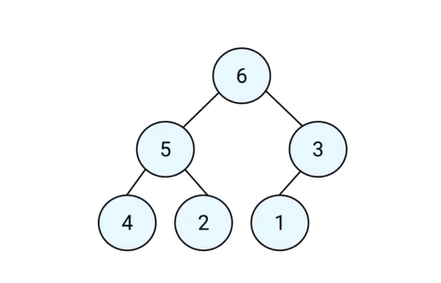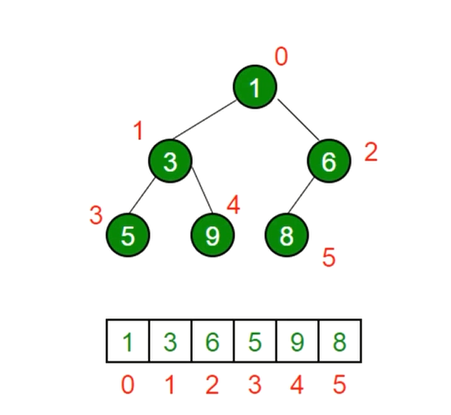# 定义
- 堆是一种特殊的完全二叉树;
完全二叉树是每层节点都完全填满,在最后一层如果不是满的,则只缺少右边的若干节点。

- 所有的节点都大于等于(最大堆)或小于等于(最小堆)他的子节点;
# js 中的堆
- js 中通常用数组表示堆;
广度优先遍历:

- 左侧子节点的位置是 2 * index + 1;
- 右侧子节点的位置是 2 * index + 2;
- 父节点位置是 (index - 1) / 2
# 堆的应用
堆能高效、快速地找出最大值和最小值,时间复杂度为 o(1);
找出第 k 个最大(小)元素;
首先构建一个最小堆,并将元素依次插入堆中;当对的容量超过 k,就删除堆顶;插入结束后,堆顶就是第 k 个最大元素;
# js 实现最小堆
主要是通过声明一个数组,然后实现插入、删除堆顶、获取堆顶、获取堆大小等方法。
# 插入
- 将值插入堆的底部,即数组的尾部;
- 然后上移:将这个值和他的父节点进行交换,直到父节点小于等于这个插入的值;
- 大小为 k 的堆中插入元素的时间复杂度为 O(logk);
class MinHeap {
constructor() {
this.heap = []
}
getParentIndex(i) {
// return Math.floor((i - 1) / 2)
return (i - 1) >> 1
}
swap(i1, i2) {
const temp = this.heap[i1]
this.heap[i1] = this.heap[i2]
this.heap[i2] = temp
}
shiftUp(index) {
if (index === 0) return
const parentIndex = this.getParentIndex(index)
if (this.heap[parentIndex] > this.heap[index]) {
// 交换值
this.swap(parentIndex, index)
// 继续上移操作
this.shiftUp(parentIndex)
}
}
insert(value) {
this.heap.push(value)
// 上移操作-参数为要插入值的数组的下标
this.shiftUp(this.heap.length - 1)
}
}
# 删除堆顶
- 用数组尾部元素替换堆顶(直接删除堆顶会破坏堆结构,因为数组的元素都会往前移动);
- 然后下移:将新堆顶和他的子节点进行交换,直到子节点大于等于这个新堆顶;
- 大小为 k 的堆中删除堆顶的时间复杂度为 O(logk);
class MinHeap {
constructor() {
this.heap = []
}
// 获取左侧子节点
getLeftIndex(i) {
return i * 2 + 1
}
// 获取右侧子节点
getRightIndex(i) {
return i * 2 + 2
}
swap(i1, i2) {
const temp = this.heap[i1]
this.heap[i1] = this.heap[i2]
this.heap[i2] = temp
}
shiftDown(index) {
const leftIndex = this.getLeftIndex(index)
const rightIndex = this.getRightIndex(index)
if (this.heap[leftIndex] < this.heap[index]) {
// 交换位置
this.swap(leftIndex, index)
// 继续下移
this.shiftDown(leftIndex)
}
if (this.heap[rightIndex] < this.heap[index]) {
// 交换位置
this.swap(rightIndex, index)
// 继续下移
this.shiftDown(rightIndex)
}
}
pop() {
this.heap[0] = this.heap.pop()
// 进行下移操作-参数为从指定位置下移的下标
this.shiftDown(0)
}
}
# 获取堆顶和堆的大小
- 获取堆顶:返回数组的头部
- 获取堆的大小:返回数组的长度
class MinHeap {
constructor() {
this.heap = []
}
// 获取堆顶元素
peek() {
return this.heap[0]
}
// 获取堆大小
size() {
return this.heap.length
}
}
整体代码:
class MinHeap {
constructor() {
this.heap = []
}
getParentIndex(i) {
// return Math.floor((i - 1) / 2)
return (i - 1) >> 1
}
// 获取左侧子节点
getLeftIndex(i) {
return i * 2 + 1
}
// 获取右侧子节点
getRightIndex(i) {
return i * 2 + 2
}
swap(i1, i2) {
const temp = this.heap[i1]
this.heap[i1] = this.heap[i2]
this.heap[i2] = temp
}
shiftUp(index) {
if (index === 0) return
const parentIndex = this.getParentIndex(index)
if (this.heap[parentIndex] > this.heap[index]) {
// 交换值
this.swap(parentIndex, index)
// 继续上移操作
this.shiftUp(parentIndex)
}
}
shiftDown(index) {
const leftIndex = this.getLeftIndex(index)
const rightIndex = this.getRightIndex(index)
if (this.heap[leftIndex] < this.heap[index]) {
// 交换位置
this.swap(leftIndex, index)
// 继续下移
this.shiftDown(leftIndex)
}
if (this.heap[rightIndex] < this.heap[index]) {
// 交换位置
this.swap(rightIndex, index)
// 继续下移
this.shiftDown(rightIndex)
}
}
// 插入元素
insert(value) {
this.heap.push(value)
// 上移操作-参数为要插入值的数组的下标
this.shiftUp(this.heap.length - 1)
}
// 移除堆顶
pop() {
this.heap[0] = this.heap.pop()
// 进行下移操作-参数为从指定位置下移的下标
this.shiftDown(0)
}
// 获取堆顶元素
peek() {
return this.heap[0]
}
// 获取堆大小
size() {
return this.heap.length
}
}
const h = new MinHeap()
h.insert(3)
h.insert(2)
h.insert(1)
# 使用场景
# 数组中的第K个最大元素
在未排序的数组中找到第 k 个最大的元素。请注意,你需要找的是数组排序后的第 k 个最大的元素,而不是第 k 个不同的元素。
示例 1:
输入: [3,2,1,5,6,4] 和 k = 2
输出: 5
https://leetcode-cn.com/problems/kth-largest-element-in-an-array/
- 解题思路:使用堆来解决;
- 解题步骤:首先构建一个最小堆,并依次把数组的值插入堆中;当堆的容量超过 k,就删除堆顶;插入结束后,堆顶就是 k 个最大元素;
/**
* @param {number[]} nums
* @param {number} k
* @return {number}
*/
class MinHeap {
constructor() {
this.heap = []
}
getParentIndex(i) {
// return Math.floor((i - 1) / 2)
return (i - 1) >> 1
}
// 获取左侧子节点
getLeftIndex(i) {
return i * 2 + 1
}
// 获取右侧子节点
getRightIndex(i) {
return i * 2 + 2
}
swap(i1, i2) {
const temp = this.heap[i1]
this.heap[i1] = this.heap[i2]
this.heap[i2] = temp
}
shiftUp(index) {
if (index === 0) return
const parentIndex = this.getParentIndex(index)
if (this.heap[parentIndex] > this.heap[index]) {
// 交换值
this.swap(parentIndex, index)
// 继续上移操作
this.shiftUp(parentIndex)
}
}
shiftDown(index) {
const leftIndex = this.getLeftIndex(index)
const rightIndex = this.getRightIndex(index)
if (this.heap[leftIndex] < this.heap[index]) {
// 交换位置
this.swap(leftIndex, index)
// 继续下移
this.shiftDown(leftIndex)
}
if (this.heap[rightIndex] < this.heap[index]) {
// 交换位置
this.swap(rightIndex, index)
// 继续下移
this.shiftDown(rightIndex)
}
}
// 插入元素
insert(value) {
this.heap.push(value)
// 上移操作-参数为要插入值的数组的下标
this.shiftUp(this.heap.length - 1)
}
// 移除堆顶
pop() {
this.heap[0] = this.heap.pop()
// 进行下移操作-参数为从指定位置下移的下标
this.shiftDown(0)
}
// 获取堆顶元素
peek() {
return this.heap[0]
}
// 获取堆大小
size() {
return this.heap.length
}
}
var findKthLargest = function(nums, k) {
const h = new MinHeap();
nums.forEach(n => {
h.insert(n)
// 堆中元素超过 k
if (h.size() > k) {
// 移除堆顶元素
h.pop();
}
});
return h.peek()
};
# 前 K 个高频元素
给定一个非空的整数数组,返回其中出现频率前 k 高的元素。
示例 1:
输入: nums = [1,1,1,2,2,3], k = 2
输出: [1,2]
https://leetcode-cn.com/problems/top-k-frequent-elements/
提示:
- 你可以假设给定的 k 总是合理的,且 1 ≤ k ≤ 数组中不相同的元素的个数。
- 你的算法的时间复杂度必须优于 O(n log n) , n 是数组的大小。
- 题目数据保证答案唯一,换句话说,数组中前 k 个高频元素的集合是唯一的。
- 你可以按任意顺序返回答案。
代码:
class MinHeap {
constructor() {
this.heap = []
}
getParentIndex(i) {
// return Math.floor((i - 1) / 2)
return (i - 1) >> 1
}
// 获取左侧子节点
getLeftIndex(i) {
return i * 2 + 1
}
// 获取右侧子节点
getRightIndex(i) {
return i * 2 + 2
}
swap(i1, i2) {
const temp = this.heap[i1]
this.heap[i1] = this.heap[i2]
this.heap[i2] = temp
}
shiftUp(index) {
if (index === 0) return
const parentIndex = this.getParentIndex(index)
if (this.heap[parentIndex] && this.heap[parentIndex].value > this.heap[index].value) {
// 交换值
this.swap(parentIndex, index)
// 继续上移操作
this.shiftUp(parentIndex)
}
}
shiftDown(index) {
const leftIndex = this.getLeftIndex(index)
const rightIndex = this.getRightIndex(index)
if (this.heap[leftIndex] && this.heap[leftIndex].value < this.heap[index].value) {
// 交换位置
this.swap(leftIndex, index)
// 继续下移
this.shiftDown(leftIndex)
}
if (this.heap[rightIndex] && this.heap[rightIndex].value < this.heap[index].value) {
// 交换位置
this.swap(rightIndex, index)
// 继续下移
this.shiftDown(rightIndex)
}
}
// 插入元素
insert(value) {
this.heap.push(value)
// 上移操作-参数为要插入值的数组的下标
this.shiftUp(this.heap.length - 1)
}
// 移除堆顶
pop() {
this.heap[0] = this.heap.pop()
// 进行下移操作-参数为从指定位置下移的下标
this.shiftDown(0)
}
// 获取堆顶元素
peek() {
return this.heap[0]
}
// 获取堆大小
size() {
return this.heap.length
}
}
/**
* @param {number[]} nums
* @param {number} k
* @return {number[]}
*/
var topKFrequent = function(nums, k) {
const map = new Map();
nums.forEach(n => {
map.set(n, map.has(n) ? map.get(n) + 1 : 1);
});
const h = new MinHeap();
map.forEach((value, key) => {
h.insert({value, key});
if (h.size() > k) {
h.pop();
}
});
return h.heap.map(a => a.key)
};
# 合并 K 个升序链表
给你一个链表数组,每个链表都已经按升序排列。
请你将所有链表合并到一个升序链表中,返回合并后的链表。
示例 1:
输入:lists = [[1,4,5],[1,3,4],[2,6]]
输出:[1,1,2,3,4,4,5,6]
解释:链表数组如下:
[
1->4->5,
1->3->4,
2->6
]
将它们合并到一个有序链表中得到。
1->1->2->3->4->4->5->6
链接:https://leetcode-cn.com/problems/merge-k-sorted-lists
- 解题思路:新链表的下一个节点一定是 k 个链表头中的最小节点;使用堆来解决;
- 解题步骤:构建一个最小堆,并依次把链表头插入堆中;然后弹出堆顶接到输出链表,并将堆顶所在链表的新链表头插入堆中;等堆元素全部弹出,合并工作就完成了。
class MinHeap {
constructor() {
this.heap = []
}
getParentIndex(i) {
// return Math.floor((i - 1) / 2)
return (i - 1) >> 1
}
// 获取左侧子节点
getLeftIndex(i) {
return i * 2 + 1
}
// 获取右侧子节点
getRightIndex(i) {
return i * 2 + 2
}
swap(i1, i2) {
const temp = this.heap[i1]
this.heap[i1] = this.heap[i2]
this.heap[i2] = temp
}
shiftUp(index) {
if (index === 0) return
const parentIndex = this.getParentIndex(index)
if (this.heap[parentIndex] && this.heap[parentIndex].val > this.heap[index].val) {
// 交换值
this.swap(parentIndex, index)
// 继续上移操作
this.shiftUp(parentIndex)
}
}
shiftDown(index) {
const leftIndex = this.getLeftIndex(index)
const rightIndex = this.getRightIndex(index)
if (this.heap[leftIndex] && this.heap[leftIndex].val < this.heap[index].val) {
// 交换位置
this.swap(leftIndex, index)
// 继续下移
this.shiftDown(leftIndex)
}
if (this.heap[rightIndex] && this.heap[rightIndex].val < this.heap[index].val) {
// 交换位置
this.swap(rightIndex, index)
// 继续下移
this.shiftDown(rightIndex)
}
}
// 插入元素
insert(value) {
this.heap.push(value)
// 上移操作-参数为要插入值的数组的下标
this.shiftUp(this.heap.length - 1)
}
// 移除堆顶
pop() {
if(this.size() === 1) return this.heap.shift()
const top = this.heap[0]
this.heap[0] = this.heap.pop()
// 进行下移操作-参数为从指定位置下移的下标
this.shiftDown(0)
return top
}
// 获取堆顶元素
peek() {
return this.heap[0]
}
// 获取堆大小
size() {
return this.heap.length
}
}
/**
* Definition for singly-linked list.
* function ListNode(val, next) {
* this.val = (val===undefined ? 0 : val)
* this.next = (next===undefined ? null : next)
* }
*/
/**
* @param {ListNode[]} lists
* @return {ListNode}
*/
var mergeKLists = function(lists) {
// 输出链表
const res = new ListNode(0);
let p = res;
const h = new MinHeap();
// 将链表中的头部插入到堆中
lists.forEach(l => {
if (l) h.insert(l)
});
while(h.size()) {
// 获取所有链表头部
const n = h.pop();
p.next = n;
p = p.next;
if (n.next) h.insert(n.next);
}
return res.next;
};